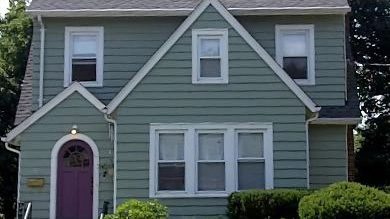 |
 |
 |
 |
 |
 |
 |
 |
 |
 |
 |
NEW JERSEY HOUSE PAINTING BLOG
Painting Costs
Should You Pick the Low-Priced Painter?
Why the Lowest Bid Could Prove Costly
If you own a house with wood siding, one of the biggest costs of maintaining your home is keeping the paint looking fresh.
Unless you’re industrious and like to tackle big, messy jobs yourself, you’ll probably need to hire a house painter once every six or eight years. When the time comes to choose a painting contractor, how can you be sure you’re getting the best price?
You’ll obviously need to compare prices, so you should get estimates from three or four painting companies.
But then what? Should you pick the painter who comes in with the lowest bid?
You could, but first consider the story of Laura Whitmire, a Maplewood, N.J., homeowner. Laura had her house painted the same month her neighbor did, and she got a firsthand look at the dangers of choosing the lowest estimate.
Although she paid a few hundred dollars more than her neighbor, Laura saved big money in the long run.
Why? Within a year, her neighbor’s paint was peeling. Everywhere.
He had to hire a new painting contractor to re-paint his house, and his two paint jobs ended up costing a lot more than Laura’s one job did.
Laura used Independent Painters of Millburn, N.J., which sanded the outside of her house down to the bare wood before painting. Her neighbor’s crew didn’t sand thoroughly, so the paint started peeling only months after they finished work.
To Laura, a few hundred dollars’ difference in price didn’t matter as much as a sense that the painter would do a good job. George Mera, owner of Independent Painters, gave her that sense.
“It was obvious George knew what he was talking about, and then, you see the results -- that it has lasted, didn’t peel,” she said. “We totally would use them again. There’s not even a question. Honestly, for the next one, we won’t even get another estimate. We’ll just go with him, because we trusted him.”
Trust is a big issue in house painting, especially in Maplewood, South Orange, Millburn, Chatham, Summit, Westfield and other northern New Jersey towns. Because of their many old homes, these areas have become competitive markets for painters. Customers seek multiple bids, which often fall within a few hundred dollars of one other.
When weighing those bids, customers should consider whether the low bidders may be more motivated to cut corners. Painters can shave money off their cost by reducing sanding coverage, failing to apply all of the primer or paint that was promised, or thinning paints and primers.
If a prospective painting contractor gives you a bid that’s hundreds of dollars more expensive than others, certainly ask him why. But you also should ask questions if you get a low offer. How does the painter plan on fulfilling the contract? Insist on high standards in surface preparation, paint quality and paint coverage, and follow up to make sure the crew sticks to the terms of the contract.
July 25, 2011

Laura Whitmire paid a few hundred dollars more than her neighbor did to get her house painted (above), but the neighbor ended up spending thousands of dollars more after his new paint peeled within the first year.
| Serving Essex, Morris and Union counties in northern New Jersey | ©Independent Painters, Inc | Web site by Jump Start |